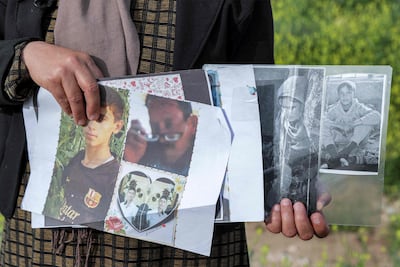A German court has convicted a woman of crimes against humanity and sentenced her to nine years in prison for keeping a Yazidi woman as a slave.
The woman, known as “Nadine K”, was also found guilty of being a member of foreign terrorist organisation and aiding and abetting genocide, German news agency dpa reported on Wednesday.
The ISIS member enslaved the young Yazidi woman for three years, during which her husband subjected her to regular sexual abuse.
Prosecutors highlighted that Nadine K was aware of her husband's actions and failed to intervene.
The accused and her husband moved to Syria in 2014 and joined the extremist organisation.
By 2015, they had moved to Mosul, Iraq, where they enslaved the Yazidi woman, Naveen Rasho.
Ms Rasho, the primary witness in the case, shared her traumatic experiences of violence and abuse under the defendant's control.
Nadine K was responsible for the household, their two daughters and Ms Rasho, who was forced to cook and clean for the couple throughout her captivity.
Despite her sentencing, Nadine K maintained her innocence, arguing that she did not coerce Ms Rasho, but expressed shame for not having done more to help her.

This case is among several in Germany involving women who travelled to ISIS-controlled territories.
Another German woman, a convert to Islam, was convicted in 2021 for allowing a five-year-old Yazidi girl she and her husband enslaved to die of thirst.
A spotlight on the Yazidi genocide
In 2014, ISIS seized large parts of Iraq and Syria, leading to the deaths of 1,200 Yazidis and the enslavement of nearly 12,000 women and girls.
A large portion of the Yazidi minority in Iraq, about 550,000, were forced to abandon their homes, predominantly in the Mount Sinjar area.
These women were taken into captivity in Iraq and Syria, where the extremists subjected them to torture, rape and forced labour.
After extensive investigation, a UN team concluded that there was “clear and convincing evidence that genocide was committed”
Germany, which is believed to house the world's largest Yazidi diaspora, officially recognised the Yazidi genocide earlier this year.
The German parliament is actively pursuing cases involving crimes committed against the Yazidi people, placing a crucial emphasis on justice for this ancient community, whose unique religious beliefs have roots in Christianity, Judaism, Islam and Manicheanism.

